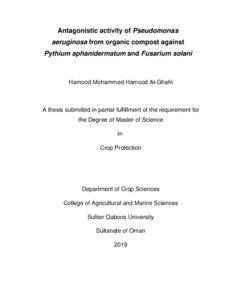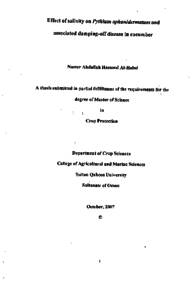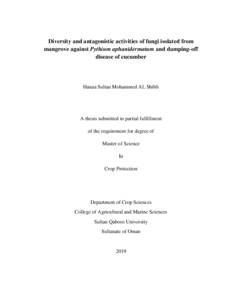Document
Antagonistic activity of Pseudomonas aeruginosa from organic compost against Pythium aphanidermatum and Fusarium solani
Publisher
Sultan Qaboos University
Gregorian
2019
Language
English
English abstract
Damping-off, caused by Pythium aphanidermatum and Fusarium solani is a destructive disease of cucumber (Cucumis sativus) worldwide. Application of fungicides and soil fumigation are the common methods of controlling damping-off disease. However, these methods are harmful to humans and the ecosystem. Biological control by using naturally existing antagonistic microorganisms is considered as an environmentally safe method of controlling plant diseases. The objectives of this study were to isolate native antagonistic bacteria from organic compost and to evaluate their ability to promote plant growth and provide protection against P. aphanidermatum and F. solani. A total of 7 bacterial colonies isolated from organic compost were screened for their in vitro antagonism against P. aphanidermatum and F. solani. Among them, two isolates designated as ISO1 and ISO2 showed significant level of antagonism and resulted in an inhibition zone ranging from 5 to 6 mm. Scanning electronic microscopic observation of the mycelium of P. aphanidermatum and F. solani at the inhibition zone showed morphological changes in the hyphae including deformation, shrinkage and loss of turgidity. Based on 16S rDNA gene sequence analysis, both bacterial strains (ISO1 and ISO2) were identified as Pseudomonas aeruginosa. The cell-free culture filtrates of Pseudomonas aeruginosa ISO1 and ISO2 significantly reduced the mycelial growth of P. aphanidermatum and F. solani under in vitro conditions. Compatibility analysis of the bacterial strains using cross-streak assay showed compatibility among them. A greenhouse experiment was conducted to evaluate the effectiveness of the antagonistic
bacteria in reducing damping-off disease incidence of cucumber. Both strains were found effective in controlling P. aphanidermatum-induced damping-off of cucumber. Soil application of Pseudomonas aeruginosa ISO1 and ISO2 reduced the yellowing and stunting of cucumber seedlings caused by Fusarium solani. This study demonstrates the effectiveness of Pseudomonas aeruginosa strains ISO1 and ISO2 isolated from organic compost in the management of damping-off of cucumber. It also shows that organic compost has bacteria strains with antagonistic activity against some plant diseases.
Description
Thesis
Member of
Resource URL
Arabic abstract
يعتبر مرض سقوط البادرات أو عفن التاج والجذر من الأمراض النباتية الفتاكة المنتشرة حول العالم، وهو مرض يصيب نبات الخيار )الاسم العلمي: Cucumis sativus (، وينشأ بسبب فطر البيثيوم وفطر الفيوزاريوم. ونظرا لصعوبة السيطرة على الآفات النباتية المنتقله عبر التربة، فقد شاع استخدام مبيدات الفطريات والتعقيم بالتبخير داخل البيوت الزجاجية للسيطرة على انتشار المرض، إلا أن تلك الطرق مضرة بصحة البشر وبالأنظمة البيئية، لذلك تعد استراتيجيات المكافحة البيولوجية عبر استخدام الكائنات المجهرية الطبيعية طريقة آمنة بيئيا للسيطرة على هذه الأمراض النباتية. يتمثل الهدف من هذه الدراسة في عزل بعض سلالات البكتيريا من السماد العضوي)الكمبوست( وتقييم قدرتها على تعزيز نمو النبات وتوفير الحماية ضد فطري الفيوزاريوم والبيثيوم. خلال هذه التجربة، تم إجراء الفحص على مجموعة من سبع مستعمرات بكتيرية معزولة من السماد العضوي في المختبر وتقييم فعاليتها ضد فطري الفيوزاريوم والبيثيوم. وقد أظهرت سلالتان من البكتيريا مستوى عالي من المناهضة الجرثومية؛ إذ تراوحت مساحة المنطقة المثبطة من 5 إلى 6 ملم. كما أظهر المسح بالمجهر الإلكتروني للعزل الفطري للفيوزاريوم والبيثيوم التغير الشكلي بما في ذلك التشوه والانكماش وخسارة الحجم. واستنادا إلى الحمض النووي 16S rDNA ، اتضح أن تلك السلالتان تنتميان للبكتيريا Pseudomonas aeruginosa . وأظهر تحليل
التطابق لكلا النوعين من البكتيريا باستخدام فحص التقاطع-التوافق بين العينتين المعزولتين انهما متوافقتان مع بعضها البعض، وعند استخدام مستخلص بكتيريا Pseudomonas aeruginosa ادى ذلك الى انخفاضٌ في وزن الغزل الفطري لفطر البيثيوم المزروع في وسط البطاطا (PDB) ، وكذلك انخفاض في نمو فطر فيوازريوم سولاني، كما أجريت تجربة البيوت الزجاجية بهدف تقييم فاعلية البكتيريا في تقليل نسبة سقوط البادرات لنبات الخيار. ونجحت كلتا السلالتان في السيطرة على انتشار فطر البيثيوم عن طريق تقليل معدل الإصابة بالمرض بنسبة%55. بالإضافة إلى أن استخدام بكتيريا Pseudomonas aeruginosa قلل من اصفرار وتقزم النبات الناشئ بسبب فطر فيوزاريوم سولاني. تبين هذه الدراسة مدى فاعلية بكتيرياPseudomonas aeruginosa عند فصله من السماد العضوي في التحكم بالأمراض التي تصيب نبات الخيار بسبب فطر فيوزاريوم سولاني وفطر بيثيوم أفانيدرماتوم كما تؤكد على أنالسماد العضوي )الكمبوست( يحتوي على سلالات بكتيرية مختلفه مضادة للأمراض النباتية.
التطابق لكلا النوعين من البكتيريا باستخدام فحص التقاطع-التوافق بين العينتين المعزولتين انهما متوافقتان مع بعضها البعض، وعند استخدام مستخلص بكتيريا Pseudomonas aeruginosa ادى ذلك الى انخفاضٌ في وزن الغزل الفطري لفطر البيثيوم المزروع في وسط البطاطا (PDB) ، وكذلك انخفاض في نمو فطر فيوازريوم سولاني، كما أجريت تجربة البيوت الزجاجية بهدف تقييم فاعلية البكتيريا في تقليل نسبة سقوط البادرات لنبات الخيار. ونجحت كلتا السلالتان في السيطرة على انتشار فطر البيثيوم عن طريق تقليل معدل الإصابة بالمرض بنسبة%55. بالإضافة إلى أن استخدام بكتيريا Pseudomonas aeruginosa قلل من اصفرار وتقزم النبات الناشئ بسبب فطر فيوزاريوم سولاني. تبين هذه الدراسة مدى فاعلية بكتيرياPseudomonas aeruginosa عند فصله من السماد العضوي في التحكم بالأمراض التي تصيب نبات الخيار بسبب فطر فيوزاريوم سولاني وفطر بيثيوم أفانيدرماتوم كما تؤكد على أنالسماد العضوي )الكمبوست( يحتوي على سلالات بكتيرية مختلفه مضادة للأمراض النباتية.
Category
Theses and Dissertations



